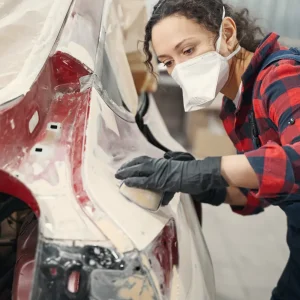Having good eyesight is a legal requirement for UK drivers, in fact more than 2,800 people have failed their practical test in the last five years alone before even getting into the car due to failing the 20m registration sight test. However, it’s crucial that license holders ensure they have their eyes regularly checked to ensure they are up to standard and it’s imperative that fleet managers encourage any drivers within their business to make a conscious effort to look after their eyes.
Encourage staff to take regular breaks when driving
While legislation is in place to ensure drivers don’t spend more than nine hours a day on the road, it’s integral that regular breaks are taken throughout any long journeys to avoid tired, dry, and strained eyes. Ensure there are clear notices and guidance in place for your drivers within your place of work, and if you have a regular set of vehicles, somewhere within the car as well.
When driving, it is advised that drivers blink regularly, particularly when on long stretches of road that offer little stimulus to the individual controlling the vehicle. Drivers can also use the ’20-20-20′ rule when safe to do so: take a 20 second break from your line of sight to look at something 20 feet away every 20 minutes. This will give your eyes a chance to rest and is an effective way to reduce eye strain.
Encourage staff to give up smoking
Smoking exposes your eyes to high levels of oxidative stress and has been linked to the risk of cataracts, glaucoma, diabetes, and dry eye syndrome, all of which can have long term health implications and on road safety in the process.
Quitting smoking at any stage of life can be beneficial, reducing the risk of developing eye threatening conditions. Encouraging staff to quit smoking and pointing them in the direction of relevant schemes is an excellent way to maintain greater levels of vision both on and off the road.
Do not allow drivers to drive when tired
Driving when tired or not 100% alert will lower response time and control over the wheel. Certain medications may also be made with a drowsy formula and significantly reduce your ability to drive safely so it’s important to check this with any new employees or staff that might require a vehicle.
Ensure windows and mirrors are clean
This may sound obvious but ensure your fleet is regularly cleaned.
Before setting off, ensure the driver checks their line of sight and that mirrors are clean of any dirt and smudges, to ensure a clear field of vision. Keep windows clean to avoid increased glare and condensation.
Wear sunglasses with the correct protection
If your staff are regularly on the road, exposure to ultraviolet (UV) light can cause eye health problems. It’s important to ensure that all employees wear appropriate eye protection throughout the year. Fast fashion retailers do not always produce sunglasses with the correct materials to avoid harmful UV light. You should make workers aware that glasses with appropriate UVA and UVB protection are important and polarised glasses can be a great option for this to reduce glare caused by reflections from hoods, windows and mirrors.
Encourage regular eye checks
Even if your staff are doing all of these things to look after their eyes, it’s crucial that they take regular eye examinations to help spot sight loss or damage at an early stage. Optometrists can help detect conditions such as cataracts, glaucoma, and age-related macular degeneration, so encouraging your staff to make regular visits to the optician is an important step in maintaining good eye health.
Simple measures such as posters around the office or sending regular reminders in the form of an internal newsletter can be an easy way to promote staff checks.





